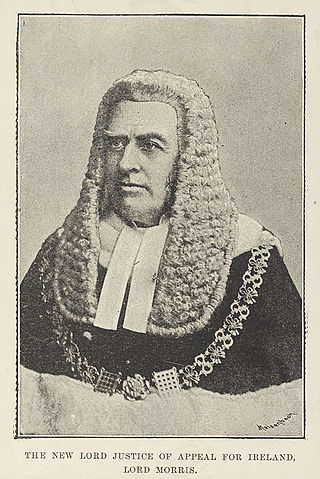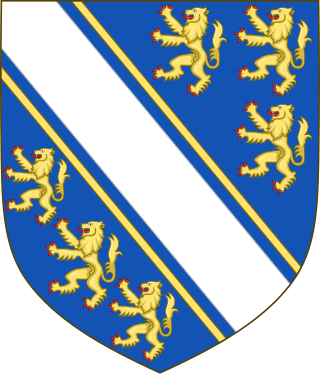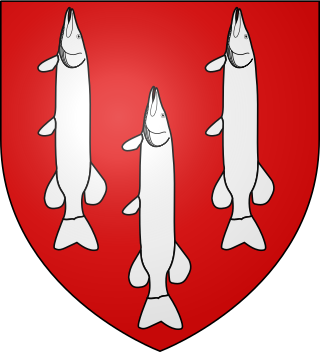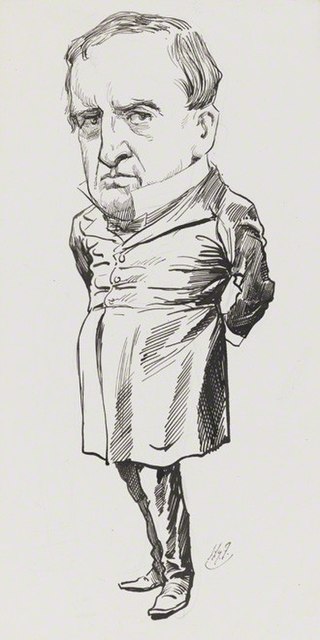
Pope John XXII, born Jacques Duèze, was head of the Catholic Church from 7 August 1316 to his death in December 1334.

The Attorney-General for Ireland was an Irish and then United Kingdom government office-holder. He was senior in rank to the Solicitor-General for Ireland: both advised the Crown on Irish legal matters. With the establishment of the Irish Free State in 1922, the duties of the Attorney-General and Solicitor-General for Ireland were taken over by the Attorney General of Ireland. The office of Solicitor-General for Ireland was abolished at the same time for reasons of economy. This led to repeated complaints from the first Attorney General of Ireland, Hugh Kennedy, about the "immense volume of work" which he was now forced to deal with single-handedly.

John de Bohun, 5th Earl of Hereford was born in St Clement's, Oxford to Humphrey de Bohun, 4th Earl of Hereford and Elizabeth of Rhuddlan, a daughter of Edward I of England.

The title Baron Multon de/of Egremont was created once in the Peerage of England. On 6 February 1299 Thomas de Multon was summoned to Parliament. On the death of the second baron, the barony fell into abeyance in 1334.
The Barony of Norragh in County Kildare was an Irish feudal barony: that is, the holder had the right to call himself Baron, but did not hold a peerage and had no right to sit in the Irish House of Lords.

de Lucy or de Luci is the surname of an old Norman noble family originating from Lucé in Normandy, one of the great baronial Anglo-Norman families which became rooted in England after the Norman conquest. The first records are about Adrian de Luci who went into England after William the Conqueror. The rise of this family might have been due to Henry I of England, although there are no historical proofs that all de Lucys belonged to the same family. The family name is Gallo-Roman, mentioned in 616 as Luciacus, Lucy, Luci, Lucé derive from the Latin cognomen Lucius, meaning "born with the daylight" or Gaulish Lucus, Lucius, Lucco from Loco- / Luco- possibly "wolf" + suffix -(i)acum "place, property" of Gaulish origin.
The Master of the Rolls in Ireland was a senior judicial office in the Irish Chancery under English and British rule, and was equivalent to the Master of the Rolls in the English Chancery. Originally called the Keeper of the Rolls, he was responsible for the safekeeping of the Chancery records such as close rolls and patent rolls. The office was created by letters patent in 1333, the first holder of the office being Edmund de Grimsby. As the Irish bureaucracy expanded, the duties of the Master of the Rolls came to be performed by subordinates and the position became a sinecure which was awarded to political allies of the Dublin Castle administration. In the nineteenth century, it became a senior judicial appointment, ranking second within the Court of Chancery behind the Lord Chancellor of Ireland. The post was abolished by the Courts of Justice Act 1924, passed by the Irish Free State established in 1922.

William Nicholas Keogh PC was an unpopular and controversial Irish politician and judge, whose name became a byword in Ireland for betraying one's political principles.

The Chief Baron of the Irish Exchequer was the Baron (judge) who presided over the Irish Court of Exchequer. This was a mirror of the equivalent court in England, and was one of the four courts which sat in the building in Dublin which is still called The Four Courts.
John L'Archers, Larger or L'Archer was an English-born cleric and judge who had a distinguished career in Ireland, holding the offices of Lord Chancellor of Ireland and Deputy Justiciar. He died during the first outbreak of the Black Death in Europe and was probably a victim of it.

The Court of Exchequer (Ireland), or the Irish Exchequer of Pleas, was one of the senior courts of common law in Ireland. It was the mirror image of the equivalent court in England. The Court of Exchequer was one of the four royal courts of justice which gave their name to the building in Dublin in which they were located, which is still called the Four Courts, and is in use as a court house.
Walter de Islip, or de Istlep was an English-born cleric, statesman, and judge in fourteenth-century Ireland. He was the first Chief Baron of the Irish Exchequer; he also held the offices of Treasurer of Ireland, Chief Escheator, and Custos Rotulorum of Kilkenny. He was a noted pluralist, who held numerous clerical benefices. His career was damaged by accusations of corruption and maladministration. He played an important role in the celebrated Kilkenny Witchcraft Trials of 1324.
Robert de Scardeburgh, or de Scardeburg was an English judge who also held high judicial office in Ireland.
John de St Paul, also known as John de St. Pol, John de Owston and John de Ouston, was an English-born cleric and judge of the fourteenth century. He was Archbishop of Dublin 1349–62 and Lord Chancellor of Ireland 1350–56. He had previously been Master of the Rolls in England 1337–40. Apart from a brief period of disgrace in 1340, he enjoyed the confidence of King Edward III. He was described as a zealous supporter of English rule in Ireland, but also as a pragmatic statesman who was willing to conciliate the Anglo-Irish ruling class. He did much to enlarge and beautify Christ Church, Dublin, although virtually no trace of his improvements survive, as they were destroyed by the Victorian rebuilding of the cathedral.
John Gernoun, or Gernon was an Irish landowner, soldier and judge who held office as Serjeant-at-law (Ireland) and Chief Justice of the Irish Common Pleas. He gave good service to the Crown during the Scottish Invasion of 1315-18, but as a judge, he was accused of injustice.

Thomas Bache was an Anglo-Italian cleric and judge who held high office in Ireland in the later fourteenth and early fifteenth centuries. He served one term as Lord High Treasurer of Ireland and three terms as Chief Baron of the Irish Exchequer.

Thomas de Dent, Thomas Dyvelyn, Thomas Denton, or Thomas of Dublin was an English-born cleric and judge who held high office in Ireland during the reign of King Edward III, and was praised as a diligent and hard-working Crown official, who damaged his health through overwork.
Thomas de Chaddesworth, de Chedworth or de Chadsworth was an English-born Crown servant and cleric who spent some fifty years in Ireland, and died there at a great age.
Walter de Cusack was an Anglo-Irish judge, magnate and military commander of the fourteenth century.
William Fauvel, or Flauvel was an English-born judge and Crown official of the fourteenth century, part of whose career was spent in Ireland. Despite his eminence, he died in prison in England while awaiting sentence for murder.









